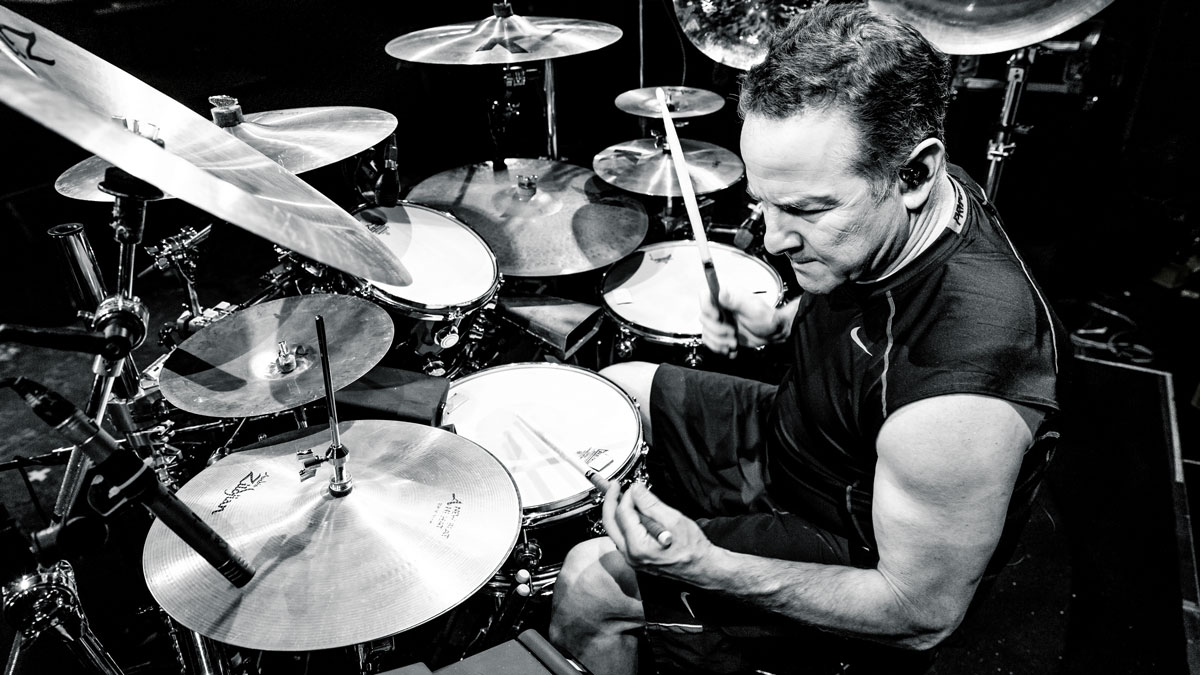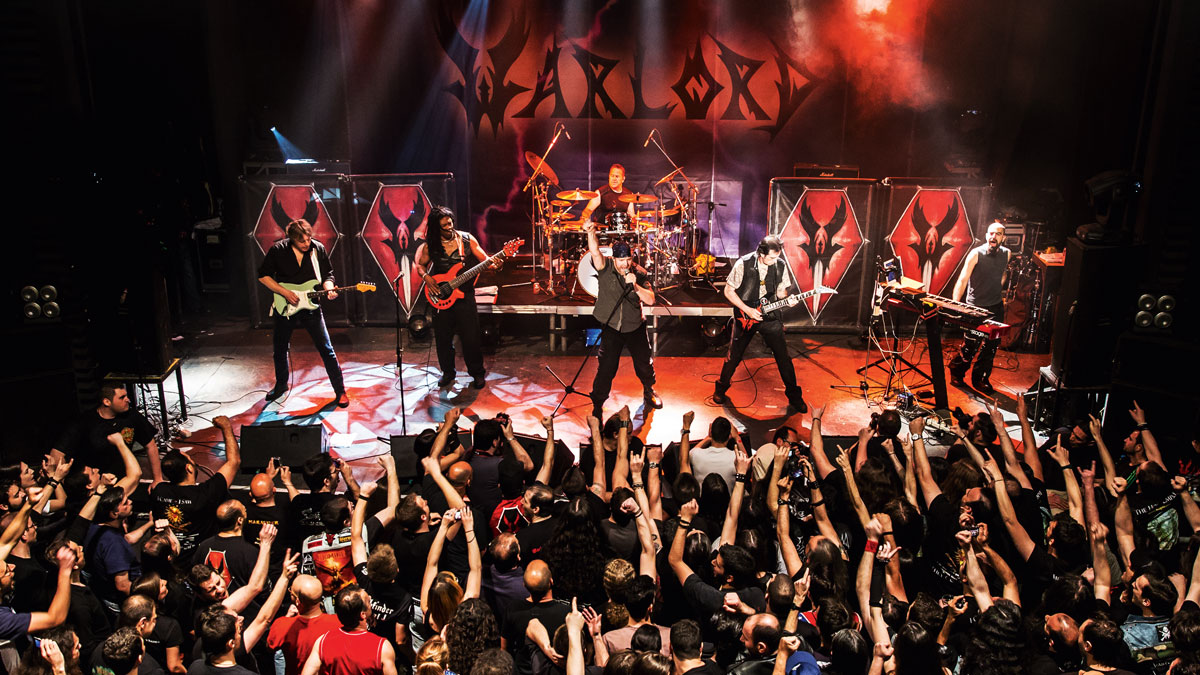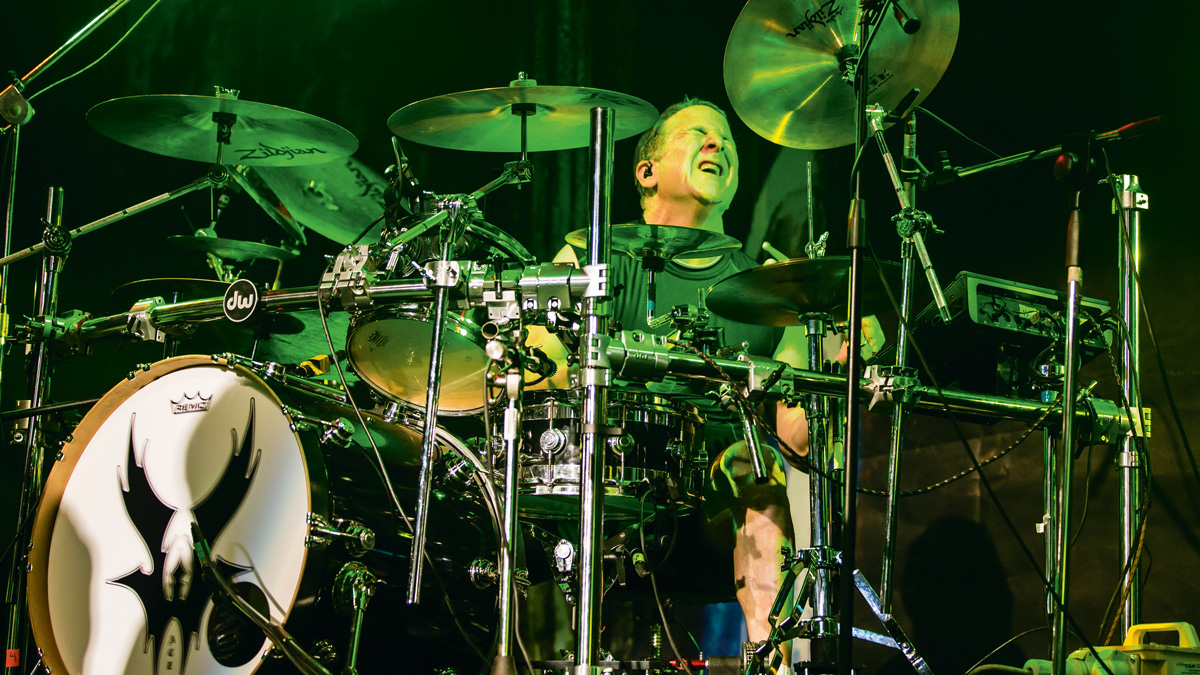Mark Zonder talks Warlord, Graham Bonnet and more
Veteran session ace discusses stepping into Cozy's shoes

Early days
Change is inevitable. We see it especially in the music industry. Players today are finding out that their skill sets need to include more than drumming.
Such is the case with Mark Zonder. Throughout his music career he has adapted to the industry’s changing landscape by being a businessman, band member, studio drummer and educator. At the core though, everything always comes back to the groove.
Old school was all about a practice pad and then to a snare drum. Not like today where kids start on a kit.
Mark began playing drums at the age of seven while in grade school in Northern California. His commitment and drive led to the drum slot in the band Warlord, a lesser known, though highly influential group in the California metal scene of the ’80s.
This led in turn to mark joining progressive rock band Fates Warning. Once again, the band may not have achieved the level of commercial success that some of their peers attained, but their contribution is significant nonetheless. With the addition of Zonder, the band’s songs became more intricate and complex, but retained a groove that was smooth and uncontrived.
Mark also stretched out stylistically by playing in a variety of bands including the new wave band Animotion. It was during this time period that he honed his knowledge of electronic percussion and made it part of his personal sound, blending the electronics in with his acoustic kit.
After several acclaimed albums with Fates warning, mark put out an album in 2007 with his solo project Slavior. He is also an educator, performing drum clinics and releasing an instructional DVD that covers the techniques he used in various songs by Fates Warning, Slavior and Warlord.
In addition to currently being involved in [Rainbow vocalist] Graham Bonnet’s new solo band, Mark maintains a busy schedule doing remote recording via his well-equipped home studio and running one of Los Angeles’ top recording space rental facilities, AJ & Syd’s Bump City studios, in North Hollywood, California.
We caught up with Mark after his return to the States from a tour of the UK with Bonnet and talked to him about his career thus far.
Was there anything pivotal in your formative years that impacted or inspired your playing?
“It came in different waves. I started playing and had my first lessons when I was seven. The lessons were on and off because I wouldn’t practise and my parents would stop the lessons! I didn’t have a drumset until I was 13. Old school was all about a practice pad and then to a snare drum. Not like today where kids start on a kit. It’s brutal when you think about it.
You use both traditional and matched grip. Do you have a preference?
“I’ve always played traditional. I switch back and forth for different things. Sometimes it depends on the mood I’m in. Each one gives me different things. Contrary to popular belief, I can get just as much power out of a traditional grip playing a straight backbeat as I can with matched. Sometimes I feel it gives me more control. I’m better with the 16th and 32nd notes on and off the hi-hat with traditional grip. I like the feel of it, the way the stick lays in my hand.”

Scaling back
You’ve trimmed your kit size down over the years. What led to that decision and how does it affect your approach to playing?
“Well, if it was good enough for Buddy [Rich] it’s good enough for me! It pulls things out of me. I’m using the kick as another tom, more like musical notes, so you develop a style where the kick is not used just on the ‘1’. It’s used within the fills, so it’s developed my independence quite well. It also forces me to be more creative. Not changing notes per se, maybe changing up the phrasing, making groupings that speak musically.
You don’t need nine toms. It’s the stickings and how they coordinate with each other. I always say dynamics aren’t necessarily about hitting.
“I thought with a smaller kit and a double pedal, there was more room. Also, you include-in the electronics, and it just opens me up. On the last Slavior demo, I have a riff where I’m playing the rim of one of the drums. It’s in a break-down. It’s really just expanding. A lot of that came from Garibaldi.
“You don’t need nine toms. It’s the stickings and how they coordinate with each other. I always say dynamics aren’t necessarily about hitting. Some guys think dynamics are just hitting a smaller crash. But the dynamics are making the snare drum sound really loud here because the two notes after it are taps. Now, if I went crash, crash and snare, the snare’s not going to seem as loud because there’s all that other stuff going on.
Keep the pocket. You can still have a pocket in seven.
“To me, coming up with dynamic things, and a space and a feel and a groove, is more important than ‘the riff’. But, I’m also a firm believer in making the groove so cool and unbelievable that you don’t have to play chops and riffs, because your groove is so cool. It’s like a [Jeff] Porcaro thing. On the Slavior record, there’s a song called Another Planet. It’s the left hand playing a cowbell. Simple stuff when you break it down, but when you hear it you go, ‘wow!’
How did you shift gears from that busier style of playing to a more simple approach in Graham Bonnet’s band?
“What a lot of people don’t realise is, my playing with Warlord and Fates Warning and all the hiring I get by other guys to play all this crazy, progressive stuff, that’s not where I come from. I come from meat and potatoes. Bad Company, UFO, The Scorpions – hard rock. I was always a big song guy. Even back in the days of Donovan, Strawberry Alarm Clock and Simon and Garfunkel.
“Things I listened to as a kid, The Monkees, Last Train To Clarksville and Stepping Stone, those were songs, not drum things. I really come from more of a song-oriented point of view. The whole drum thing came about because I had an opportunity and I was schooled and smart enough to go, ‘okay, if we’re playing in seven, this is how you play and keep the groove.’ as much as I’ve had to play all the progressive stuff, I’ve always tried to keep the groove in there as well.
“Keep the pocket. You can still have a pocket in seven. It’s more about a repetitive phrase that people can catch on to than playing a bunch of notes and every bar changing it around. Playing in this band was a nice awakening, to be able to really concentrate on the groove, the pocket and really making it sit. It’s knowing that you’re playing commercial hard rock tunes where it’s kick and snare.
“You’re the guy dictating what’s going on as far as the pulse and really making a move. When you look out there and see the people singing along, you’re the guy driving that. You start playing a little too edgy, it’s not going to feel right. Breaking it down was great. It was a simple four-piece kit, I was using bigger drums. Two crashes on each side, a ride, hi-hat, and a double pedal. It was so simple.
“I could concentrate on the feel and lay it in there and communicate with the other people in the band in making that album have quality, smooth groove, tight sound. It’s funny, but in Fates Warning or Warlord, I never confuse two songs with each other. Commercial hard rock, sometimes you get into that thing of, ‘is the verse two times or four times? Are we going back to the bridge?’ So, it was more memorisation of parts that was nerve wracking. But I went into it, especially with Cozy Powell’s parts, of honouring those parts.”

Cozy's swagger
Cozy Powell seems to be a common denominator with Graham and some of the bands he’s been involved in.
“Well, he and Graham were really good friends. It was a big thing for me. Growing up, I loved his playing. I actually loved more of his attitude and the way he presented things. That cocky swagger. What I’m going to do is play it the way it’s supposed to be played because it was played that way for a reason.
“If I thought I had a better part, it didn’t matter. That’s what was done and that’s what people want to hear. So we keep it true to form. I’ve been on the other side of the fence, where I’ve had people come in and play my stuff. Not that I was offended that they didn’t play it right, but I appreciated people that took the time to learn what I did, and play that as they appreciated how it fit the song as opposed to winging it.
“It’s art. You’re supposed to be duplicating it. That’s what all these tribute bands do. That’s what people want to hear. They don’t want to hear Freebird in a shuffle form [laughs]. I know there’s a lot of versions of classic bands that are out there now. Not too many of them are playing what it’s really supposed to be. A lot of them are jamming and the guitar player, who’s the star, plays over the top.
It’s art. You’re supposed to be duplicating it. That’s what all these tribute bands do.
“I was picking out every little open hi-hat. It was there for a reason. I asked Graham about some parts because it didn’t make a lot of rhyme or reason compared to the way I do things. He said Cozy would go in and play whatever he felt like playing, it just happened! Cozy didn’t sit down with a pencil and paper and write it down. It’s all feel. He’s a strong drummer and I also wanted to represent the strength as well, really laying it in there.
“Another thing that I noticed that was cool was not a lot of busy 16th notes on the hi-hat. It was a lot of quarter and eighth notes. The guitar would carry that rhythm. I went and studied YouTube. I looked for anything that I could find of cozy live. I really wanted to represent it.”
Besides the tour and festival dates, you’re also doing an album with Graham?
“It’s a double album, 16 of the older songs redone, then a studio album with brand new material. There’s also the live DVD and audio recording from the Frontiers festival in April. We won’t be doing anything new for that. We’re in the mixing stages of the record. There’s 11 new songs. It will be out on Frontiers Records in November. The live DVD will come out after the record. Graham sounds great.”
Do you have any career accomplishments that you are particularly proud of?
“Being 58 years old and still playing and the fact that I’ve been able to do this since I was very young [laughs]! With the studio, my drum recordings, and bands I’ve played with, I’ve been able to make a living. There were a lot of lean times in the beginning.
“Back in the day, we lived in a 400 sq ft place in North Hollywood divided into four to five little bedrooms. One small window, no air conditioning. In the summer it was brutal. But, we were playing. It didn’t matter. Those were some really good times. This didn’t come overnight and it never happened with a big bang. It just rolled. I still get to play a big show occasionally with Graham’s stuff. Playing Sweden Rock was a big deal. We’re playing a couple of festivals in Germany with UFO. I’ll take it!”